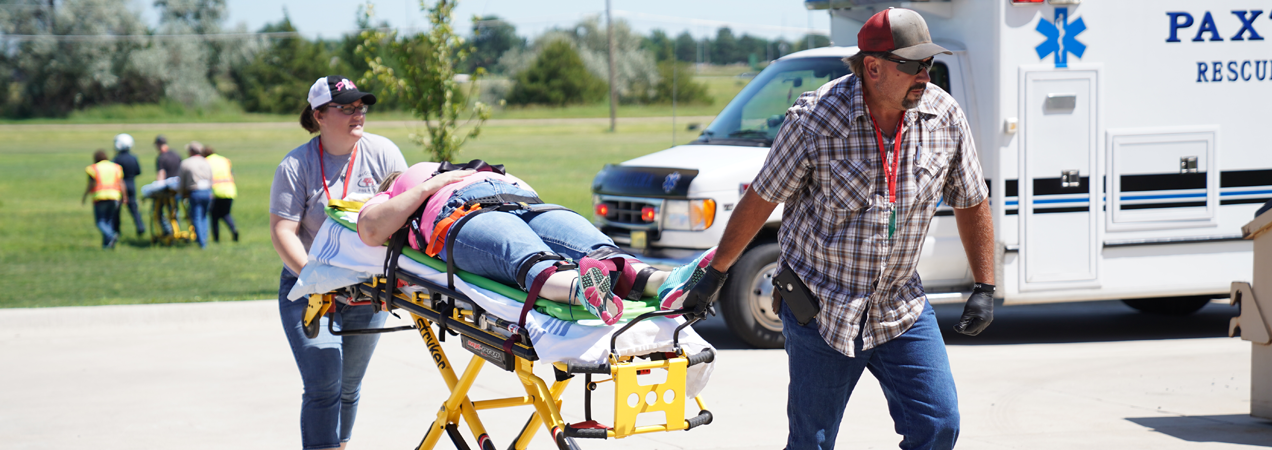MPCC offers a traditional paramedic program that focuses on part-time, non-traditional students. The goal of the program is to prepare Paramedics who are competent in the cognitive (knowledge), psychomotor (skills), and affective (behavior) learning domains to enter the profession.
The course of study is designed to enhance all facets of a paramedic’s scope of practice.
The didactic training is offered two evenings a week and one full Saturday per month
over a 15-month period.
Afterward, students have up to 12 months to complete their clinical and field training
at participating medical facilities and EMS agencies.
Upon successful completion of the program, students are eligible to sit for the National Registry certification exam. Academic awards include a Diploma or an Associate of Applied Science degree in Emergency Medical Services.
Employment opportunities include hospital emergency rooms, private ambulance services, off-shore oil rigs, movie sets, reality shows and salaried fire and emergency medical services departments. Emergency medical services and fire science are synonymous in some communities.
A degree is essential for advancement and financial compensation in most fire departments. Some states now require a minimum of the Associate of Applied Science degree to certify.
MPCC’s Emergency Medical Services program does not offer job placement assistance.
Prerequisite Courses
- BIOS 1100 – Basic Anatomy & Physiology (or equivalent) OR
- BIOS 2250 and BIOS 2260 – Human Anatomy & Physiology I and II (or equivalent)
Regardless of course taken, the student must pass with a C+ or above. - EMTL 1520 - Emergency Med Technician I (4.0 credit hours)
- EMTL 1530 - Emergency Med Technician II (4.0 credit hours)
- EMTL 1110 - American Heart BLS Provider (0.5 credit hours)
Due by First Day of Class
- Certificates of completion of NIMS 100 and NIMS 700 courses (National Incident Management System - NIMS)
- Certificate of completion for Hazardous Materials awareness or Hazardous Materials operations (OSHA compliant or NFPA Standards)
Once admitted into the program, a criminal background check at your expense will be conducted by a certified agency and a block of immunizations must be completed.
A seat reservation may be made for any session.
Program Specific Fees
Students should anticipate completing 26.5 credits of didactic coursework and 10 credits of clinical training. For the 2025–2026 academic year, the cost per credit hour is $124 for resident and border-state students, and $156 for out-of-state students. Total semester costs will vary depending on the individual course schedule.
Additional Expenses
- Program Fee of $2200. Includes the following:
- Required textbooks
- Lab Supplies
- Photocopies
- PlatinumEd access. PlatinumEd is an online platform used to track student performance and competencies in the lab, clinical, and field settings.
- Two program uniform shirts for clinical and field rotations
- You have the option to purchase additional shirts at $35-$45 per shirt, dependent on size.
- All compliance tracking is completed by a third-party company called CastleBranch.
Your background check, verification of your immunization records, and verification
of your professional certifications/licenses are completed by CastleBranch. The annual
subscription is currently $89.
- Bloodborne Pathogens and HIPAA training: Your clinical sites will require proof of
completion of Bloodborne Pathogens and HIPAA training. You may submit certificates
of completion from prior training for review. Classes are available through CastleBranch
for $15 each.
- Optional National Certification Classes: During the didactic phase of the program,
you have the option of taking Advanced Medical Life Support (AMLS) and Pre-Hospital
Trauma Life Support (PHTLS). While these classes are not required, they are strongly
recommended as they provide knowledge validation and better opportunities for employment
upon completion of the Paramedic program. The cost for each class is (1) credit hour
plus the cost of the textbook; estimated cost is ~$200.
- Computer and Internet Access: Internet access is required for the duration of the
program. College internet is free to you and computers are available to checkout for
on-site use if needed. Away from MPCC, cost will vary.
- Medical Insurance: It is recommended that students carry medical insurance throughout
the entire program. Medical insurance is required during clinical training. Cost will
vary.
- Physical exam: Many clinical sites require results from a recent physical exam (less
than one year) to confirm you are fit for duty. Cost will vary.
- Immunizations: A block of immunizations is required; up-to-date immunization status
must be maintained for the duration of the program. This may require you to complete
an immunization series prior to the program, update an immunization during the program,
or have titers drawn. Cost will vary.
- Toxicology Screening: Many sites require results from a recent urinalysis drug screen
before you can schedule or participate in clinical rotations, and each site has its
own specific requirements. Cost will vary.
- Uniforms for Clinical and Field Rotation: Program uniform shirt (provided), dark clean
pants (EMS pants or dark trousers, no denim), dark, clean, rubber-soled shoes, MPCC
student ID badge. Cost will vary.
- Travel and Transportation: Hospital clinical training and Field internships are completed
at a variety of sites across the USA. Students must have adequate transportation and
will need to make their own arrangements for room and board. Students must plan for
all travel costs. Cost will vary.
- Meals Away from Home: Once away from MPCC, options may include sack lunches, hospital
cafeterias, personal meal prep, restaurants, or eating at home. Cost will vary.
All costs are estimated and subject to change without notice.
CAAHEP-accredited Paramedic educational programs and CoAEMSP Letter of Review (LOR) Paramedic educational programs track and report outcome measures annually to the Committee on Accreditation for the Emergency Medical Services Professions (CoAEMSP).
The most current COAEMSP Annual Report was for the calendar year 2023.
| Outcome | 2023 | 2022 | 2021 |
|
Retention |
96.9% | 68.4% | 58.3% |
|
NREMT or State Cognitive exam |
93.5% | 100% | 100% |
|
Placement |
90.3% | 92.3% | 92.9% |

